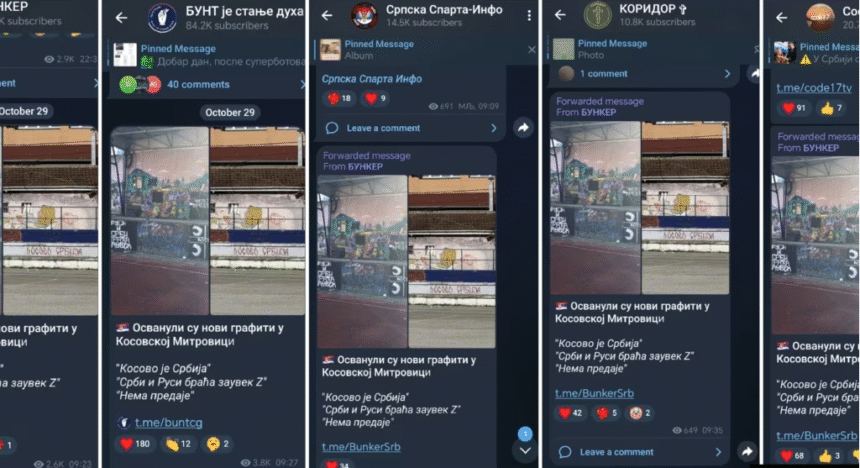Several pro-Russian Telegram channels, presenting themselves as the “voice of Russia in Serbia” or using Russian symbols like the national flag, are increasingly targeting Kosovo. These channels spread content that delegitimizes Kosovo’s institutions, denies its independence, and often promotes radical rhetoric, including calls for military intervention.
Hate speech targeting Albanians appears in almost every post concerning Kosovo. Many of these channels emerged after the Russian invasion of Ukraine in February 2022, now boasting between 10,000 and 80,000 followers, who receive and share content daily. Posts typically support Russia, endorse the occupation of Ukraine, oppose Serbia’s EU membership, and criticize collaboration with Western countries.
Experts describe Telegram as more than a messaging app in recent years, particularly in Russia—it has become a platform for political propaganda, due to its encryption and user anonymity. Ivana Stradner, a collaborator at the Foundation for the Defense of Democracies in Washington, told Radio Free Europe that these channels are used by Moscow as an “information weapon.”
“These channels pose a threat invisible to ordinary citizens—they cannot see or touch it,” Stradner said. “On the surface, the posts may seem like conspiracy theories, but perception plays a key role: social networks shape beliefs to achieve security objectives.”
The mass creation of Telegram channels covering Kosovo coincided with rising tensions in northern Kosovo after Serbs withdrew from Kosovo institutions in November 2022. The channels often operate in a coordinated network, amplifying specific narratives rapidly.
For example, on October 29, the channel “Bunker” reported graffiti in North Mitrovica reading: “Kosovo is Serbia” and “Serbs and Russians are brothers forever.” Within minutes, the post was shared by other channels like “Srpska Sparta-Info,” “Bunt je stanje duha,” “Koridor,” and “Code 17,” collectively reaching over 130,000 users.
Narratives frequently portray Serbs as victims of Kosovo authorities, delegitimize Kosovo institutions, and employ derogatory language for Albanians. For instance, “Bunker” reported on the construction of a school in North Mitrovica as a project by “Albanian terrorists,” while “Koridor” described FSK military exercises with similarly hostile language.
These Telegram channels often echo official Serbian political narratives, using derogatory terms for Albanians, portraying Kosovo institutions as oppressive, and framing Serbs as persecuted. This alignment with state messaging amplifies radicalization and polarizes opinions.
Stradner emphasized that repeated exposure to propaganda shapes public perception: even if users don’t immediately believe the content, constant messaging fosters emotional reactions like anger, fear, or apathy, making individuals less able to form independent judgments.
The impact is evident across the Western Balkans, where anti-Western propaganda has polarized societies, influencing public attitudes toward the EU and international cooperation.
To counter these campaigns, Stradner suggests the EU should deploy hybrid warfare teams to help societies defend against information operations and disinformation.







